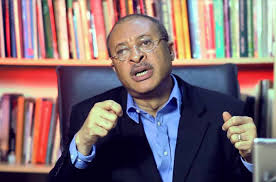Unnerved by the idea of forming a shadow government, the Nigerian Department of State Security (DSS) has instituted a case in court to stop renowned economist and political activist Professor Patrick Utomi and others from proceeding with the novel idea.
The Secret Service dragged Professor Utomi to the Federal High Court in Abuja in a suit marked FHC/ABJ/CS/937/2025, with the claim that the creation of a shadow government and a shadow cabinet is a direct attempt to illegally usurp the executive powers of President Bola Tinubu, stating that it is against the country’s law.
On May 7th, Professor Utomi, who was a presidential candidate of the African Democratic Congress (ADC) in the 2007 presidential election, announced the creation of a shadow government to fill the role of opposition against the ruling party, the All Progressives Congress, following the mass defections of former opposing politicians to the party, including the Governor of Delta State, Sheriff Oborevwori, and the PDP vice presidential candidate in the 2023 election, Ifeanyi Okowa.
Tagged as a “national emergency response” under the banner of the Big Tent Coalition Shadow Government, the Professor of economics further announced that the opposition movement would consist of experts and politicians from other political parties to speak against policies which undermine the Nigerian democracy and its dividends to the people.
He further announced that the coalition would also have a cabinet which would consist of members that would operate as police watchdog, think tank and offering alternative voices to the government. Some of the members of the cabinet are renowned lawyers, policy experts among others.
However, the DSS frowned at this development, stating that the creation of a shadow government can create a parallel government outside the Federal Government of Nigeria, and it can lead to political unrest and a tool for separatist movements to engage in unconstitutional activities that can pose threats to national security.
As a result, the DSS in its case affidavit filed through its lawyer, Mr Kehinde Akinlolu, SAN, named Professor Utomi as the sole defendant, reaffirmed its statutory position as the body empowered to prevent the country from threats to the lawful authority of the Federal Republic of Nigeria and Its constituent institutions.
Due to its role, the plaintiff urged the court to declare the shadow government and shadow cabinet planned by the defendant and his associates as“unconstitutional as it amounts to an attempt to create a parallel authority not recognized by the Constitution of the Federal Republic of Nigeria, 1999 (as amended).”
It added that the court should declare that under Sections 1(1), 1(2) and 14(2)(a) of the Constitution, “the establishment or operation of any governmental authority or structure outside the provisions of the Constitution of the Federal Republic of Nigeria, 1999 (as amended). is unconstitutional, null, and void.”
The DSS further argued that during the inauguration of the ‘shadow cabinet’, Utomi reportedly stated that it includes the Ombudsman and Good Governance portfolio to be led by Dele Farotimi; a Policy Delivery Unit team comprising Oghene Momoh, Cheta Nwanze, Daniel Ikuonobe, Halima Ahmed, David Okonkwo, and Obi Ajuga; as well as a Council of Economic Advisers.
The DSS stated: “Based on the intelligence gathered by the plaintiff, the activities and statements made by the defendant and his associates are capable of misleading segments of the Nigerian public, weakening confidence in the legitimacy of the elected government, and fuelling public disaffection.”
“The plaintiff, in the discharge of its statutory duties, has gathered intelligence confirming that the defendant’s actions pose a clear and present danger to Nigeria’s constitutional democracy.
“The defendant’s actions amount to an attempt to usurp or mimic executive authority, contrary to Sections 1(1), 1(2), and 14(2)(a) of the 1999 Constitution (as amended), which exclusively vests governance in institutions duly created under the Constitution and through democratic elections.
“The Federal Government of Nigeria has made several efforts to engage the defendant to dissuade him from this unconstitutional path, including statements made by the Minister of Information, but the defendant has remained defiant
“The defendant’s actions amount to an attempt to usurp or mimic executive authority, contrary to sections 1(1), 1{2), and 14(2Xa) of the 1999 Constitution (As Amended), which exclusively vests governance in institutions duly created under the Constitution and through democratic elections.
“The Federal Government of Nigeria has made several efforts to engage the defendant to dissuade him from this unconstitutional path, including statements made by the Minister of Information, but the defendant has remained defiant.
“It is In the interest of justice, national security, and the rule of law for this honourable court to declare the existence and operations of the defendant unconstitutional and illegal,” the plaintiff added.


More Stories
Oyetola, Oyebamiji and the Osun Guber Equation
IBEDC: When Will This Pain Be Over?
Where is the President of the Federal Republic of Nigeria?